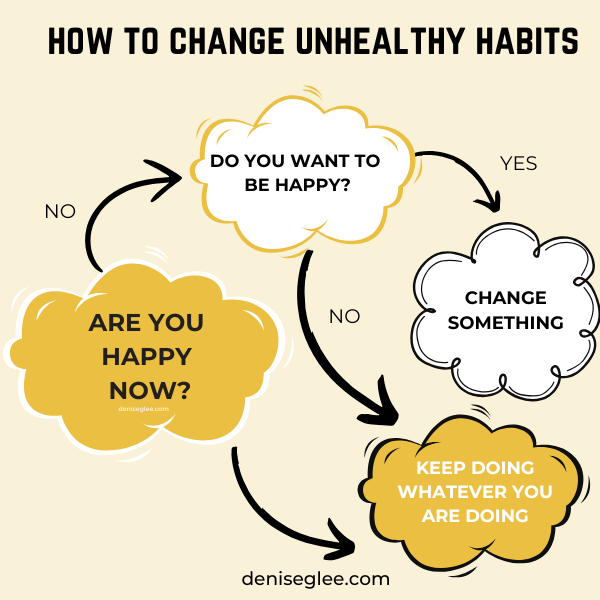
Breaking Free from Unhealthy Habits: A Guide for Leaders
As a healing and leadership coach, I often see leaders and business owners struggling with bad habits that can hold them back and make it hard to reach their goals. Understanding why it’s tough to let go of these habits is the first step to making positive changes.
This article will look at why we stick to unhealthy habits and relationships and offer practical ways to break free. We’ll also discuss how recognizing these patterns can help in your personal and professional life. By the end, you’ll understand better how to make lasting, positive changes in your behavior.
First, let’s discuss the obvious: why having unhealthy habits is detrimental not only to your business but also to your health.
If we're being honest, some of us love being busy. We love feeling wanted and important. But that hustle-and-bustle mindset will only lead to a full-blown breakdown or even a court-ordered anger management class if you don't schedule moments of rest.
Denise G Lee Tweet
Why Dealing Unhealthy Habits is Important for Leaders

Willpower and Self-Control:
Research shows that willpower is crucial for making lifestyle changes. But it’s easier said than done. Many people struggle with adopting healthier habits because they lack willpower. This is especially common if you’re under stress, have trouble managing your emotions, or are juggling multiple priorities. If you don’t have the strength to keep everything together, it can hurt you both professionally and personally.
Passion and Enthusiasm:
Great leaders who show excitement and energy in their work can strongly impact their teams. They create a positive and encouraging atmosphere. When a leader is happy and passionate about a project or goal, this energy spreads to the team. It lifts their spirits and motivates everyone to work harder, even during tough times. This shared excitement brings the team together. It helps them tackle challenges by focusing on solutions instead of getting stuck on problems.
One leader who shows this kind of exciting and energetic leadership is Richard Branson, the founder of the Virgin Group. Branson is known for his lively and passionate way of running his businesses. He always brings a lot of energy to his work, which greatly affects his teams. His adventurous spirit and willingness to take on big challenges with excitement create a positive atmosphere in his companies. When Branson is enthusiastic about a project, it lifts the spirits of his team members and encourages them to work harder, even when things get tough. This shared excitement helps the team come together and focus on finding solutions to problems instead of getting stuck on them.
Work-Life Balance:
Finding a good work-life balance means regularly checking your priorities and making thoughtful changes. One study found that working too much can hurt both employees and employers. Leaders who balance their work and personal life can set a good example for their teams, improving overall well-being and productivity.
And before you snap at the computer and say, “My bills don’t care if I’m stressed,” hear me out. I’m not going to lie and say the world will stop spinning if you need to ask for a pause. And yes, there are times when you have unmovable deadlines.
But let’s not create our own disasters. If we’re being honest, some of us love being busy. We love feeling wanted and important. But that hustle-and-bustle mindset will only lead to a full-blown breakdown or even a court-ordered anger management class if you don’t schedule moments of rest. In the next section, I’ll talk about how to bring more sanity into your day.
Ethical Leadership and Influence:
Leadership is about guiding a group towards shared goals. Effective leaders work with their teams to set common objectives, which are more easily achieved when everyone works together. This approach not only boosts team performance but also strengthens the relationship between leaders and their teams.
Even though we know these habits did not help then and now, we still get stuck. In the next section, let’s talk about why it is easy to get stuck with in unhealthy habits.
Reasons Why We Get Stuck with Unhealthy Habits

Reason #1: Perceived Loyalty and Loss of Benefits
One reason people find it hard to let go of unhealthy habits is feeling loyal to them or fearing they’ll lose something valuable. This often relates to the “sunk cost fallacy,” which means we keep doing something because we’ve already put a lot of time, effort, or money into it, even if it’s not good for us.
For example, if you’ve been in an unhealthy romantic relationship for years, you might keep your partner just because you’ve invested so much time in the relationship. Even though you know this situation is bad for your emotional health, the thought of losing that you spent with that person can make it hard to quit.
Reason #2: Inaccurate Cost/Benefit Analysis
Another reason we stick with unhealthy habits is that we often misjudge the costs and benefits. For instance, you might keep an energy draining client because it pays well, even though it’s harming your health.
This mistake happens because we might overvalue the benefits, like the payout, and undervalue the costs, like stress and poor health. In reality, the harm from keeper that contract might be greater than we think, making it harder to see that changing the situation could be better for us in the long run.
Reason #3: Learned Helplessness
Learned helplessness is when we feel powerless to change our situation because we’ve faced uncontrollable problems before. This can make us feel resigned and stuck in negative habits or relationships.
For example, if you’ve tried and failed to quit vaping several times, you might start to believe that quitting is impossible. Even though it’s not, this feeling of helplessness can keep you stuck in the same unhealthy patterns, making it tough to break free.
Reason #4: Routine and Habits

Habits are actions we do automatically because we’ve done them many times before. They become a part of our daily lives, making them tough to change. For example, think about how you instinctively grab your phone as soon as you wake up.
Since routines are not easy to break, you need to put in some effort to create new ones. However, it’s important to understand that the old habit doesn’t disappear; it just becomes less noticeable. For example, it’s quite hard to resist reaching for your phone if you place it on your nightstand. Something drastic needs to happen.
That’s why you need to establish a structure as well as support to help you change your behavior. This is why changing habits can be difficult without strong motivation, accountability, and support from others. I talked about it on social media. Click the link below to join the conversation.
Have you ever thought to yourself, “I want to feel better, but I don’t want anything to change?”
— Denise G. Lee (@DeniseGLee) December 6, 2024
If so, congratulations—you’ve passed the HONEST HUMAN TEST.
It’s completely natural to crave consistency. Predictable and familiar routines help our nervous system stay calm, giving… pic.twitter.com/4swp6kwUiV
Reason #5: Nostalgia
Nostalgia can also keep us tied to unhealthy habits or relationships. We might romanticize the past, remembering only the good times while ignoring the bad. I remember one client who had an abusive ex that bought her expensive gifts after an incident. In fact, she was wearing one of her favorite necklaces from him when she revealed this to me. She was figuratively and literally attached to her abuser.
This sentimental attachment makes it hard to let go, even when we know that what we’re holding onto isn’t good for us. We are not just letting go of the person or activity; we are letting go of all the good that came from that situation.
Reason #6: Observation of Family Patterns
The behaviors we observe in our families can have a lasting impact on us. If you grew up in a household where unhealthy habits were the norm, you might find yourself repeating those patterns as an adult. Breaking free from these ingrained behaviors often requires a lot of self-awareness and sometimes professional help. Understanding that these patterns aren’t your fault, but that they can be changed, is an important step in moving forward.
Now that you know the reasons why we can get stuck, let’s talk about the other reasons why we find ourselves not fixing our problems that others can see so clearly.
Why Can’t We See What Others Can?
Sometimes, it’s easier for others to see our unhealthy habits than it is for us. This is because other people often have emotional distance from our problems, giving them clarity that we might lack. When we’re emotionally involved, our judgment can be clouded by biases and emotional responses. For example, you might not see how your constant complaining is affecting your team, but a colleague might notice it right away.
Emotional Distance
Emotional distance helps other people look at our situation more clearly. They can easily see the simple steps we need to take to get from where we are to where we want to be. On the other hand, our feelings can cloud our judgment, making us hold on to a bad plan instead of choosing a better one. This is why feedback from others is so helpful—it gives us a viewpoint that we might miss on our own.
Cognitive Biases and Perception
Our perception is influenced by our previous knowledge, expectations, and mood. This can sometimes lead us to see things that aren’t really there, or to miss things that are obvious to others. For example, if you expect a task to be difficult, you might perceive it as more challenging than it really is. This thinking or cognitive bias can make it hard for us to see our own problems clearly, while others can often offer clearer insights.
Alright, I hope that makes sense. Next, let’s talk about how we can break free from these types of unhealthy habits.
Transform Your Life: 6 Tips to Break Free from Unhealthy Habits!
Getting rid of things that don’t help you doesn’t need to be dramatic, but it does need to be done on purpose. Knowing why you have unhealthy habits is just the start. To make real changes, you need to use strategies that actually work.
Here are some practical, science-backed methods to help you break free from unhealthy habits:
Awareness and Introspection
- Identify Triggers: Recognize the situations, emotions, or people that trigger your unhealthy habits. This helps you anticipate and avoid them.
- Self-Reflection: Write down why you want to change and what keeps you from doing so. This can clarify your motivations and the obstacles you face.
Replace Unhealthy Habits
- Substitute with Healthy Alternatives: Instead of just stopping a behavior, replace it with a healthier one. For example, if you snack on junk food, try keeping healthier snacks like nuts or fruit on hand.
- Visualize Success: Mentally practice the desired behavior in challenging situations. Visualization can reinforce positive actions over negative ones. This can help improve your overall mental health.
Modify Your Environment
- Remove Triggers: Change your environment to make unhealthy habits harder to perform. If you tend to overeat in front of the TV, consider eating at the table instead.
- Use Visual Reminders: Place notes or stickers in key locations to remind you of your goals and encourage positive behavior.
Get Support
- Join Forces with Others: Partner with someone who shares your goal. Mutual accountability can be a powerful motivator.
- Surround Yourself with Positive Influences: Spend time with people who live the way you want to live. Their habits and attitudes can positively influence your own.
Relax & Plan for Setbacks/Relapses
- Prepare for Discomfort: Understand that breaking habits can be uncomfortable. Develop strategies to tolerate and manage these feelings, such as practicing relaxation techniques.
- Plan for Setbacks: Accept that relapses may occur. Plan how you will respond to setbacks and focus on quickly returning to your desired behavior.
Reinforce New Behaviors
- Reward Yourself: Set up incentives for maintaining new habits. For example, save money you would have spent on unhealthy habits and treat yourself to something special.
- Strengthen New Routines: Repeatedly practice new behaviors until they become automatic. This helps suppress old habits and reinforce new ones.

Final Thoughts
Breaking away from unhealthy habits or relationships is tough, but it can be done with the right support and strategies. By understanding why you get stuck and working to replace bad habits with good ones, you can make positive changes in your life.
If you’re ready to grow personally or professionally, I’d be happy to help you as your coach. Together, we can face these challenges and build a healthier, more successful future.
To learn more, check out an episode of my podcast where I talk about letting go of unhelpful habits and relationships. Remember, change is possible, and you don’t have to do it alone.





